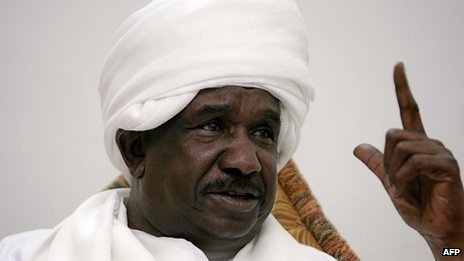
Sudanese Gen. Mustafa al-Dabi, the Minister of Intelligence, is the Arab League envoy to Syria. The Arab League took a delegation to Syria during December 2011., a photo by Pan-African News Wire File Photos on Flickr.
January 22, 2012
Arab League Floats Ambitious New Peace Plan for Syria
By KAREEM FAHIM
New York Times
DAMASCUS, Syria — Faced with the failure of its observer mission to curb the violence here as the stark features of a civil war emerge, the Arab League on Sunday unexpectedly floated an ambitious peace proposal that would require President Bashar al-Assad to hand over power to a deputy and start negotiations with his opponents within two weeks.
The proposal, which appeared to be modeled on the agreement recently signed by President Ali Abdullah Saleh of Yemen, also calls for a government of national unity to be formed within two months, followed by presidential and parliamentary elections.
“We ask that the Syrian regime leave and hand over power,” Sheikh Hamad bin Jassim al-Thani, Qatar’s foreign minister, said in Cairo, according to Reuters. “We are with the Syrian people, with their will and with their aspirations.”
There was no immediate official reaction from the Syrian government, but it seemed highly unlikely to accept any plan that would remove Mr. Assad from office and give some power to his opponents, whom his government routinely calls terrorists.
In Cairo, representatives of the Syrian National Council, an opposition group, welcomed the proposal, but said there would be no negotiations until Mr. Assad stepped down.
With little immediate chance of success, the proposal reflected divisions within the Arab League over how to confront the Syrian crisis, as well as the league’s mounting sense of helplessness as the death toll mounts. Hundreds of people have been killed by security forces since the league sent observers to the country in early December, and armed opponents of the government have demonstrated growing power in recent weeks.
Twenty miles from Damascus, former soldiers and armed residents have wrested control of the city of Zabadani from the army, though few people in the town think the government intends to keep its troops away for long. Activists in the town of Douma, about 10 miles from Damascus, said Sunday that after a day of heavy clashes there, defecting soldiers controlled three neighborhoods, though the security forces were still present.
Ahmed, an antigovernment activist who spoke on condition that his last name be withheld, said that hundreds of soldiers in the area had defected in recent weeks. “If Douma is liberated, that means that the next attack will be in the heart of Damascus,” he said. “The Assad army becomes weaker and weaker, while the armed resistance and the Free Syrian Army becomes stronger,” he added, referring to a militia made up of defectors.
Feelings were just as strong at the country’s largest military hospital, in Damascus, where doctors and administrators said about 25 wounded soldiers were now arriving each week, and roughly the same number of corpses. Two soldiers from the same company nursed wounds at the hospital that they said they received in separate ambushes near the Lebanese border. They said their well-armed opponents were part of an “outside conspiracy.” “It will end soon,” said one.
Down the hall, Dr. Wahib Sultan said opposition groups had given ordinary Syrians little reason to support them. “We want some change,” he said, but “they don’t give us any political program, any social program.” He added, “No one in any country can accept what is happening here.”
Saudi Arabia and Qatar have pushed for more aggressive action against Syria. On Sunday, the Saudi foreign minister, Saud al-Faisal, said that his country would withdraw its observers from the Arab League delegation, whose mandate was renewed on Sunday for another month, because the “Syrian government did not implement the Arab plan,” according to The Associated Press.
He was referring to an earlier plan, agreed to by the Syrian government, that called for it to withdraw tanks and heavy weapons from cities and to release political prisoners. On Sunday, the league said Syria had not fully complied, though it cited signs of progress.
The new plan calls for elections within five months to an assembly that would draft a new Syrian constitution. Foreign ministers of the league’s members said they would ask the United Nations Security Council to endorse it.
It bore a resemblance to an agreement signed in November by President Saleh of Yemen, calling for him to hand over power to his deputy in exchange for immunity from prosecution. The new Arab League proposal for Syria made no mention of immunity, but called for an independent body “to investigate abuses.”
Louay Hussein, a prominent Syrian opposition activist in Damascus, said the league’s plan reflected the changing nature of the conflict in Syria. “We are facing a crisis, and the violence is spreading,” Mr. Hussein said. “Some parties in the opposition are seeking a Libyan scenario, but we are confronting this plan. We should enter a political process.”
Huwaida Saad and another employee of The New York Times contributed reporting from Damascus, and Omnia Al Desoukie contributed reporting from Cairo.
No comments:
Post a Comment